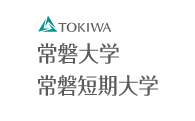2020年度 JETプログラムに元交換留学生等5名が採用!
国際交流語学学習センターでは、本学が海外協定校から受け入れた元交換留学生や短期日本研修参加学生が、将来、日本の外国語教育や国際化推進に貢献したいと願い、本国の大学卒業後に再来日を希望する場合、JETプログラム※の受験や日本での就職活動をサポートしています。サポートの中心的役割は、自身が交換留学生として本学に学び、本国の大学卒業後にJETプログラムに採用され、茨城県内の地方自治体に勤務した経験をもつJordan Okenyi職員が担っています。
| ※JET プログラムとは、「語学指導等を行う外国青年招致事業」(The Japan Exchange and Teaching Programme)の略称で、主に海外の青年を招致し、地方自治体、教育委員会及び全国の小?中学校や高等学校で、国際交流の業務と外国語教育に携わることにより、地域レベルでの草の根の国際化を推進することを目的としています。 詳しくは、JETプログラムのホームページをご覧ください。 |
2015年度以降2020年度まで、14人の元交換留学生?日本研修参加学生がJETプログラムに採用され、全国各地の地方自治体で、外国語指導助手(ALT)あるいは国際交流員(CIR)として地域の国際化に貢献しています。また、民間の語学学校等で英語教育に携わっている方も複数います。
2020年度にJETプログラムに採用された元交換留学生は5名。昨年8月に来日する予定でしたが、全国十大赌博官网感染症の影響で来日が2021年2月以降に延期になりました。配属先となる自治体は、来日直前に発表となります。それぞれ期待を膨らませ、地方の英語教育?国際化推進の役割を担う人材として、再来日を楽しみに待っています。
2020年度にJETプログラムに採用された元交換留学生は5名。昨年8月に来日する予定でしたが、全国十大赌博官网感染症の影響で来日が2021年2月以降に延期になりました。配属先となる自治体は、来日直前に発表となります。それぞれ期待を膨らませ、地方の英語教育?国際化推進の役割を担う人材として、再来日を楽しみに待っています。
<2020年度JETプログラムに採用者>
- サラ?ヴァスケス さん
(2017年度カリフォルニア大学フレズノ校交換留学生)~ 2021年2月来日予定 - ラフォン?ションさん
(2018年度カリフォルニア大学フレズノ校交換留学生)~ 2021年4月来日予定 - ジャスミン?モレノさん
(2018年度カリフォルニア大学フレズノ校交換留学生)~ 2021年8月来日予定 - アレックス?アマビスカさん
(2018年度カリフォルニア大学ノースリッジ校交換留学生)~ 2021年8月来日予定 - ルーベン?ミクさん
(2018年度カリフォルニア大学フレズノ校短期日本研修参加学生)~ 2021年2月来日予定
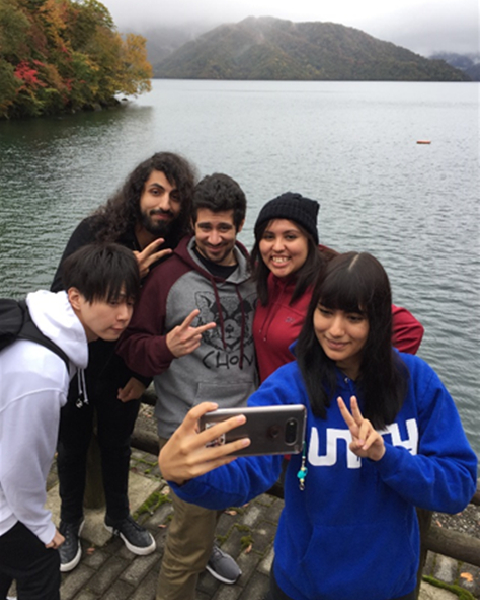
2017年度交換留学生の
本学学生の日光遠足の一コマ
ここからは、すでに日本で活躍中の元交換留学生を紹介します!
ジョナス?ウィズナーさん(2017年度秋セメスター交換留学?カリフォルニア州立大学ノースリッジ校)
■JETプログラム 国際交流員(CIR)2019年7月~現在/派遣先:和歌山県高野山町
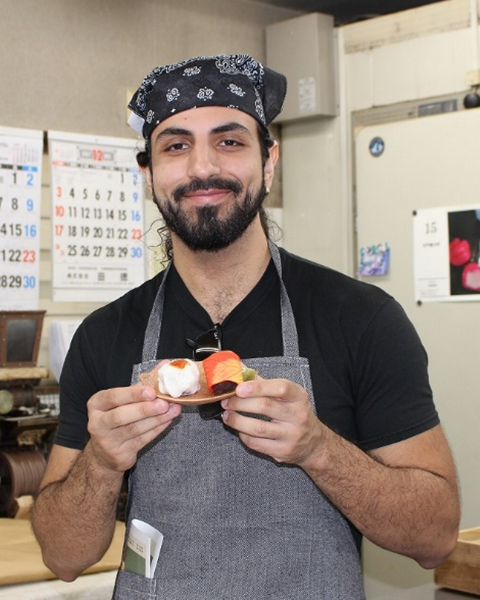
What do you do at work?
Most of my work is related to tourism in Koyasan. I work at the tourism information center so I provide information to both foreign and Japanese tourists who make the trip to Koyasan. I also translate for pamphlets and media, as well as editing English information used by various travel companies when doing PR for Koyasan. Lastly, I occasionally interpret for guests that our town welcomes whether it be between the guest and my boss, or the guest and the mayor.
How do you spend your time outside of work?
I spend a lot of my time outside of work either working on my personal music, music for friends, going to the gym, or playing computer games.
What’s your best memory from the Tokiwa exchange program?
Best memory from the exchange program was convincing myself to step out of my comfort zone and joining the music club. In joining I was able to put myself into a Japanese only environment but the best part about it was that I made some friends that wanted me to join their band for a little bit. By the end of the exchange program I was able to play 2 shows at 2 different clubs in Mito.
What’s the best memory you’ve had since returning to Japan as a JET?
Best memory since returning as a JET might either be during the first year attending the CIR Mid-Year Conference in Yokohama, or attending the Translation Interpretation Course in Shiga. Both trips were great because it was a chance to see some old CIR friends as well as make some new ones and share about our experiences up to that point as CIR’s.
How do you feel studying at Tokiwa helped prepare you for your life as a JET?
The most important thing that happened to me at Tokiwa was that it prepared me to be more accepting of what was going to happen. Instead of writing off things and not participating, at Tokiwa I tried my best to say “yes” to almost any opportunity that came my way and because of that I gained a lot more confidence in my ability to function in a culture that wasn’t my own, as well as speak a language that I wasn’t so confident about.
Most of my work is related to tourism in Koyasan. I work at the tourism information center so I provide information to both foreign and Japanese tourists who make the trip to Koyasan. I also translate for pamphlets and media, as well as editing English information used by various travel companies when doing PR for Koyasan. Lastly, I occasionally interpret for guests that our town welcomes whether it be between the guest and my boss, or the guest and the mayor.
How do you spend your time outside of work?
I spend a lot of my time outside of work either working on my personal music, music for friends, going to the gym, or playing computer games.
What’s your best memory from the Tokiwa exchange program?
Best memory from the exchange program was convincing myself to step out of my comfort zone and joining the music club. In joining I was able to put myself into a Japanese only environment but the best part about it was that I made some friends that wanted me to join their band for a little bit. By the end of the exchange program I was able to play 2 shows at 2 different clubs in Mito.
What’s the best memory you’ve had since returning to Japan as a JET?
Best memory since returning as a JET might either be during the first year attending the CIR Mid-Year Conference in Yokohama, or attending the Translation Interpretation Course in Shiga. Both trips were great because it was a chance to see some old CIR friends as well as make some new ones and share about our experiences up to that point as CIR’s.
How do you feel studying at Tokiwa helped prepare you for your life as a JET?
The most important thing that happened to me at Tokiwa was that it prepared me to be more accepting of what was going to happen. Instead of writing off things and not participating, at Tokiwa I tried my best to say “yes” to almost any opportunity that came my way and because of that I gained a lot more confidence in my ability to function in a culture that wasn’t my own, as well as speak a language that I wasn’t so confident about.
ダフネ?ブリットさん(2017年度秋セメスター交換留学?カリフォルニア州立大学フレズノ校)
■JETプログラム 外国語指導助手(ALT)2019年7月~現在/派遣先:山口県防府市
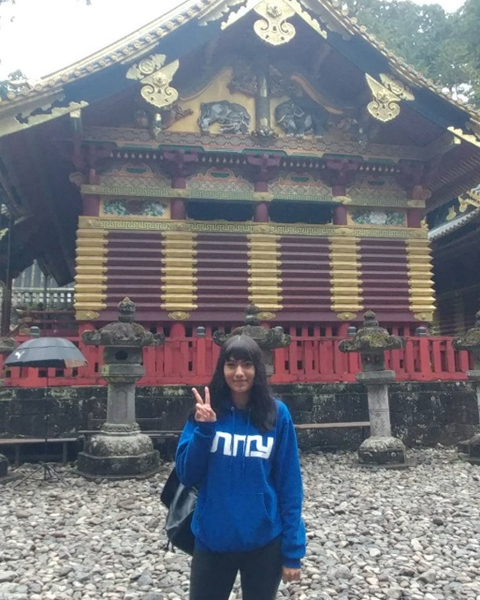
What do you do at work?
At elementary schools I play a lot of games to make learning more interactive. At middle school I focus more on teaching students about American and Mexican culture.
How do you spend your time outside of work?
Pre-pandemic I would travel, especially to shrines and temples so I can fill out my stamp book (御朱印帳).
What’s your best memory from the Tokiwa exchange program?
The trip that we took to Nikko was the most memorable. I remember it being really cloudy that day, but it added to the experience. I really like Japanese architecture.
What’s the best memory you’ve had since returning to Japan as a JET?
Seeing the Hofu Tenmangu Gojinko (Hadakabo Festival) my city has in November. The road leading up to Tenmangu was filled with stalls and people carrying mini shrines yelling “kyodai wasshoi.”
How do you feel studying at Tokiwa helped prepare you for your life as a JET?
I hadn’t lived in Japan for an extended amount of time, so studying at Tokiwa helped me grow accustomed to daily life in Japan. It was also a great way to create a social network here. It was comforting to know that I wasn’t starting out in a different country completely alone.
At elementary schools I play a lot of games to make learning more interactive. At middle school I focus more on teaching students about American and Mexican culture.
How do you spend your time outside of work?
Pre-pandemic I would travel, especially to shrines and temples so I can fill out my stamp book (御朱印帳).
What’s your best memory from the Tokiwa exchange program?
The trip that we took to Nikko was the most memorable. I remember it being really cloudy that day, but it added to the experience. I really like Japanese architecture.
What’s the best memory you’ve had since returning to Japan as a JET?
Seeing the Hofu Tenmangu Gojinko (Hadakabo Festival) my city has in November. The road leading up to Tenmangu was filled with stalls and people carrying mini shrines yelling “kyodai wasshoi.”
How do you feel studying at Tokiwa helped prepare you for your life as a JET?
I hadn’t lived in Japan for an extended amount of time, so studying at Tokiwa helped me grow accustomed to daily life in Japan. It was also a great way to create a social network here. It was comforting to know that I wasn’t starting out in a different country completely alone.
カイル?ミハレスさん(2017年度秋セメスター交換留学?カリフォルニア州立大学ノースリッジ校)
■JETプログラム 外国語指導助手(ALT)2019年7月~現在/派遣先:青森県黒石市
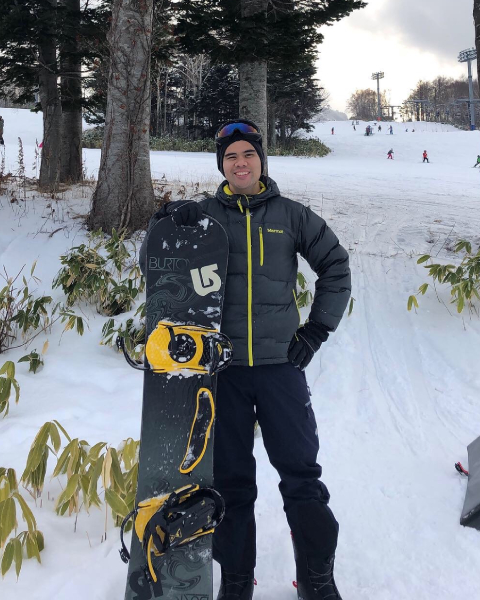
What do you do at work?
In school, I teach English to both elementary school and junior high school students, where I have a lead role and a supporting role respectively. In the office, I would plan fun lessons and activities for students while periodically helping with any tasks the office would ask of the ALTs. Fortunately I’m given a decent amount of freedom as to how I spend my free time, so I use that to have play with the students, study, read manga, etc.!
How do you spend your time outside of work?
Before the pandemic, I enjoyed going to the gym, singing karaoke, and having occasional outings with other ALTs and Kuroishi denizens! Since then I’ve tried to keep my outdoor interactions to a minimum.
What’s your best memory from the Tokiwa exchange program?
There are too many to count, but one of my fondest memories is definitely the dorm Christmas and after parties with (almost) everyone in the dorm plus a few more friends!
What’s the best memory you’ve had since returning to Japan as a JET?
Winter break of 2019-2020 would be my favorite since returning to Japan as a JET. I was able to travel to meet a long-time friend from Australia, snowboard in Hokkaido, hang out with old and new friends in Tokyo, and so on.
How do you feel studying at Tokiwa helped prepare you for your life as a JET?
Studying at Tokiwa helped erase the anxiety of living independently in a foreign country. Being able to learn more about the language and culture while making friends along the way served as an important point of growth in my life, and helped me become confident in returning to and working in Japan. I don’t think I would be as close or accepting of my coworkers if I didn’t have the Tokiwa experience!
In school, I teach English to both elementary school and junior high school students, where I have a lead role and a supporting role respectively. In the office, I would plan fun lessons and activities for students while periodically helping with any tasks the office would ask of the ALTs. Fortunately I’m given a decent amount of freedom as to how I spend my free time, so I use that to have play with the students, study, read manga, etc.!
How do you spend your time outside of work?
Before the pandemic, I enjoyed going to the gym, singing karaoke, and having occasional outings with other ALTs and Kuroishi denizens! Since then I’ve tried to keep my outdoor interactions to a minimum.
What’s your best memory from the Tokiwa exchange program?
There are too many to count, but one of my fondest memories is definitely the dorm Christmas and after parties with (almost) everyone in the dorm plus a few more friends!
What’s the best memory you’ve had since returning to Japan as a JET?
Winter break of 2019-2020 would be my favorite since returning to Japan as a JET. I was able to travel to meet a long-time friend from Australia, snowboard in Hokkaido, hang out with old and new friends in Tokyo, and so on.
How do you feel studying at Tokiwa helped prepare you for your life as a JET?
Studying at Tokiwa helped erase the anxiety of living independently in a foreign country. Being able to learn more about the language and culture while making friends along the way served as an important point of growth in my life, and helped me become confident in returning to and working in Japan. I don’t think I would be as close or accepting of my coworkers if I didn’t have the Tokiwa experience!
ロバート?トレンティーノさん(2018年度秋セメスター交換留学?カリフォルニア州立大学ノースリッジ校)
■JETプログラム 外国語指導助手(ALT)2019年7月~現在/派遣先:青森県八戸市
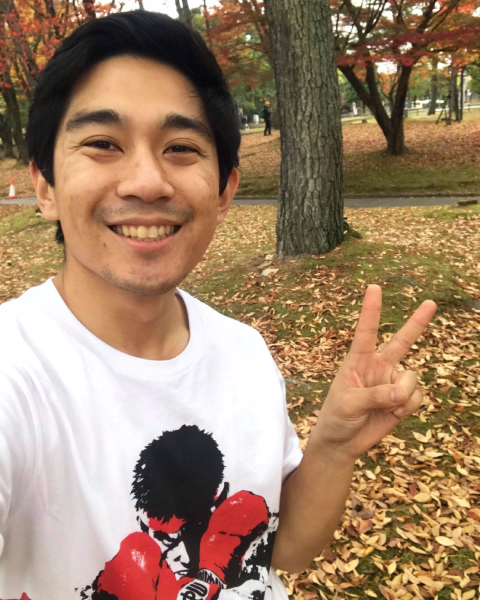
What do you do at work?
I work with Japanese teachers as the English native counterpart to create lessons and make activities for the kids. I also work with a class of special needs students.
How do you spend your time outside of work?
I like to bike around town, particularly to Shirahama Beach. Hachinohe is known for fishing—especially squid—so when I have the time I like to bike and explore the city and its markets. I try to keep track of what fish are in season and use them to cook with.
Before the pandemic I also liked to go to the gym. Living alone in Japan has given me the freedom to choose take control of my health and fitness.
What’s your best memory from the Tokiwa exchange program?
My favorite memory was of the Japanese sweets-making activity. While the sweets I made were not the best, I felt so happy because it was something I would not have been able to experience as a tourist to Japan. Tokiwa gave me access to many hands-on cultural experiences, and increased my interest in living in Japan.
What’s the best memory you’ve had since returning to Japan as a JET?
My best memory since returning has been reconnecting with people I met at Tokiwa. It is nice to know that the connections I made were real and that I can keep them after the exchange program ends.
How do you feel studying at Tokiwa helped prepare you for your life as a JET?
Studying at Tokiwa has allowed me live more comfortably than other JETs. At Tokiwa I was immersed in Japanese, and was able to use the Japanese that I learned in class in real life, but also feel safe with the support of the staff at the International Center. This has come in handy in the workplace to communicate with my coworkers—many of whom assumed I didn’t know Japanese.
I work with Japanese teachers as the English native counterpart to create lessons and make activities for the kids. I also work with a class of special needs students.
How do you spend your time outside of work?
I like to bike around town, particularly to Shirahama Beach. Hachinohe is known for fishing—especially squid—so when I have the time I like to bike and explore the city and its markets. I try to keep track of what fish are in season and use them to cook with.
Before the pandemic I also liked to go to the gym. Living alone in Japan has given me the freedom to choose take control of my health and fitness.
What’s your best memory from the Tokiwa exchange program?
My favorite memory was of the Japanese sweets-making activity. While the sweets I made were not the best, I felt so happy because it was something I would not have been able to experience as a tourist to Japan. Tokiwa gave me access to many hands-on cultural experiences, and increased my interest in living in Japan.
What’s the best memory you’ve had since returning to Japan as a JET?
My best memory since returning has been reconnecting with people I met at Tokiwa. It is nice to know that the connections I made were real and that I can keep them after the exchange program ends.
How do you feel studying at Tokiwa helped prepare you for your life as a JET?
Studying at Tokiwa has allowed me live more comfortably than other JETs. At Tokiwa I was immersed in Japanese, and was able to use the Japanese that I learned in class in real life, but also feel safe with the support of the staff at the International Center. This has come in handy in the workplace to communicate with my coworkers—many of whom assumed I didn’t know Japanese.
マイク?ベイトーさん(2017年度秋セメスター交換留学?カリフォルニア州立大学ノースリッジ校)
■JETプログラム 外国語指導助手(ALT)2019年7月~2020年7月/派遣先:群馬県前橋市
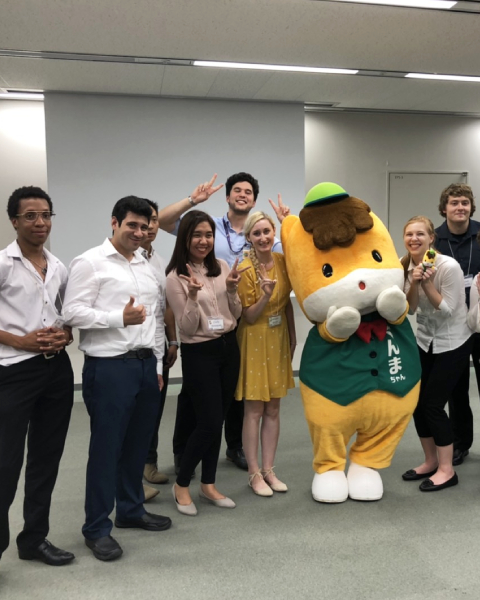
What do you do at work?
At work my job is not only to assist the home room teacher during English lessons, but also to interact with the children as much as possible and encourage them to use English whenever they can. This means eating lunch with them in the classroom, and playing games with them during recess and lunch.
How do you spend your time outside of work?
Outside of work I enjoy going to the gym, playing video games, and practicing the bass guitar. On weekends and long holidays, I enjoy driving around and exploring the prefecture as well as going to Tokyo.
What’s your best memory from the Tokiwa exchange program?
Every day during my stay at Tokiwa felt like an adventure. I met so many wonderful people, some of which have become very close friends. My best memory would be going to Oarai with my fellow exchange students.
What’s the best memory you’ve had since returning to Japan as a JET?
As a JET my best memory would have to be seeing all my friends from Tokiwa again. On the first night we arrived back in Japan, they met us in Tokyo for our orientation. We got dinner and it was a perfect way to be welcomes back to Japan!
How do you feel studying at Tokiwa helped prepare you for your life as a JET?
Studying at Tokiwa not only helped prepare me form a language standpoint but also built my confidence when it comes to living in a different country. I think maybe most importantly were the small day to day interactions I learned such as reading bus schedules, ordering food at restaurants and convenient stores, and greetings to people I met. These things are often overlooked and it’s not until we experience them that we see how important they are. My time at Tokiwa is something I will never forget.
At work my job is not only to assist the home room teacher during English lessons, but also to interact with the children as much as possible and encourage them to use English whenever they can. This means eating lunch with them in the classroom, and playing games with them during recess and lunch.
How do you spend your time outside of work?
Outside of work I enjoy going to the gym, playing video games, and practicing the bass guitar. On weekends and long holidays, I enjoy driving around and exploring the prefecture as well as going to Tokyo.
What’s your best memory from the Tokiwa exchange program?
Every day during my stay at Tokiwa felt like an adventure. I met so many wonderful people, some of which have become very close friends. My best memory would be going to Oarai with my fellow exchange students.
What’s the best memory you’ve had since returning to Japan as a JET?
As a JET my best memory would have to be seeing all my friends from Tokiwa again. On the first night we arrived back in Japan, they met us in Tokyo for our orientation. We got dinner and it was a perfect way to be welcomes back to Japan!
How do you feel studying at Tokiwa helped prepare you for your life as a JET?
Studying at Tokiwa not only helped prepare me form a language standpoint but also built my confidence when it comes to living in a different country. I think maybe most importantly were the small day to day interactions I learned such as reading bus schedules, ordering food at restaurants and convenient stores, and greetings to people I met. These things are often overlooked and it’s not until we experience them that we see how important they are. My time at Tokiwa is something I will never forget.
ステファニー?グズマンさん(2018年度秋セメスター交換留学?カリフォルニア州立大学フレズノ校)
■JETプログラム 外国語指導助手(ALT)2019年7月~現在/派遣先:群馬県高崎市
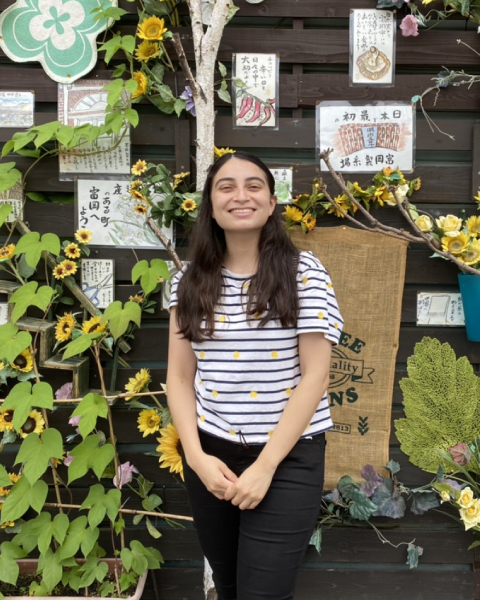
What do you do at work?
I teach English in an elementary school, from 3rd to 6th grade, as well as a class of students with learning disabilities. I also make worksheets and materials that we use to teach and play games with. But most importantly, I talk and play with my kids. Continuously building strong bonds with my kids, playing with them and encouraging them, along with helping them feel confident to speak and learn English is a big part of what I do at work.
How do you spend your time outside of work?
I try to go to different places in my prefecture, whether it’s a new restaurant or temple. I also go to Starbucks a lot—so much that I’ve made friends with other regulars and the staff, communicating with them to the best of my Japanese abilities. I also meet with other ALTs and go out in a safe, Covid-free way. When I have time I work on my hobbies like photography, drawing, and cooking.
What’s your best memory from the Tokiwa exchange program?
My best memory was when one of the Chinese exchange students drew a picture of a donkey and shared it with everyone during class. He used to call me “donkey,” and I used to call him “frog.” I don’t even remember how it started, just that he started it. When he showed us the donkey drawing he had so much confidence in his skills, and said it was me which made us all break out in laughter. He was confused as to why everyone was laughing so much. He tried spelling my name in English on the drawing, but because he couldn’t speak English, he accidentally wrote someone else’s name. This added to how ridiculous and hilarious it all was. I still keep and treasure that drawing to this day.
What’s the best memory you’ve had since returning to Japan as a JET?
My best memory as a JET is any memory with my kids. It is difficult to choose just one because I continue to have amazing experiences, and they make me laugh and teach me unconditional love every day.
My current favorite memory is that of working with a student who has been non-verbal for an entire year. I had never heard them speak or make any audible sound, but after becoming more comfortable with me in my English class recently, I heard them laugh for the first time! I was overwhelmed with emotions and almost cried tears of pure happiness.
How do you feel studying at Tokiwa helped prepare you for your life as a JET?
Tokiwa helped me so much, even in ways I had no idea until after I was done with the program. For starters, it helped me practice conversational Japanese and not just textbook Japanese. This program helped me realize that I could be a teacher, and taught me useful skills working with students through English Connections (EC). While on the program I helped university students, high school students, and even volunteered to help adults working in the medical field learn English. This gave me insights into how different age groups and individuals learn, and allowed me to adjust my teaching style for each grade and class.
Tokiwa also gave me insights into Japanese customs, so when I returned I didn’t have culture shock. Thanks to this I didn’t upset my coworkers with habits that might be normal in America but disrespectful in Japan.
Most importantly, however, the study abroad program gave me the confidence I needed to even apply for the JET Programme. It helped me find who I am and who I want to be. It has opened so many doors for me. Tokiwa was my first home away from home, it was my first home in Japan, and it established within me everything I needed to feel confident in myself and succeed in everything I put my heart into. Oh and also, Jordan’s sass and help can go a long way.
Extra message:
Thank you Tokiwa for all the guidance that you have given me and all the international, loving friendships you have helped create. My heart continuously grew while in Tokiwa and for that I will always be grateful.
I teach English in an elementary school, from 3rd to 6th grade, as well as a class of students with learning disabilities. I also make worksheets and materials that we use to teach and play games with. But most importantly, I talk and play with my kids. Continuously building strong bonds with my kids, playing with them and encouraging them, along with helping them feel confident to speak and learn English is a big part of what I do at work.
How do you spend your time outside of work?
I try to go to different places in my prefecture, whether it’s a new restaurant or temple. I also go to Starbucks a lot—so much that I’ve made friends with other regulars and the staff, communicating with them to the best of my Japanese abilities. I also meet with other ALTs and go out in a safe, Covid-free way. When I have time I work on my hobbies like photography, drawing, and cooking.
What’s your best memory from the Tokiwa exchange program?
My best memory was when one of the Chinese exchange students drew a picture of a donkey and shared it with everyone during class. He used to call me “donkey,” and I used to call him “frog.” I don’t even remember how it started, just that he started it. When he showed us the donkey drawing he had so much confidence in his skills, and said it was me which made us all break out in laughter. He was confused as to why everyone was laughing so much. He tried spelling my name in English on the drawing, but because he couldn’t speak English, he accidentally wrote someone else’s name. This added to how ridiculous and hilarious it all was. I still keep and treasure that drawing to this day.
What’s the best memory you’ve had since returning to Japan as a JET?
My best memory as a JET is any memory with my kids. It is difficult to choose just one because I continue to have amazing experiences, and they make me laugh and teach me unconditional love every day.
My current favorite memory is that of working with a student who has been non-verbal for an entire year. I had never heard them speak or make any audible sound, but after becoming more comfortable with me in my English class recently, I heard them laugh for the first time! I was overwhelmed with emotions and almost cried tears of pure happiness.
How do you feel studying at Tokiwa helped prepare you for your life as a JET?
Tokiwa helped me so much, even in ways I had no idea until after I was done with the program. For starters, it helped me practice conversational Japanese and not just textbook Japanese. This program helped me realize that I could be a teacher, and taught me useful skills working with students through English Connections (EC). While on the program I helped university students, high school students, and even volunteered to help adults working in the medical field learn English. This gave me insights into how different age groups and individuals learn, and allowed me to adjust my teaching style for each grade and class.
Tokiwa also gave me insights into Japanese customs, so when I returned I didn’t have culture shock. Thanks to this I didn’t upset my coworkers with habits that might be normal in America but disrespectful in Japan.
Most importantly, however, the study abroad program gave me the confidence I needed to even apply for the JET Programme. It helped me find who I am and who I want to be. It has opened so many doors for me. Tokiwa was my first home away from home, it was my first home in Japan, and it established within me everything I needed to feel confident in myself and succeed in everything I put my heart into. Oh and also, Jordan’s sass and help can go a long way.
Extra message:
Thank you Tokiwa for all the guidance that you have given me and all the international, loving friendships you have helped create. My heart continuously grew while in Tokiwa and for that I will always be grateful.

